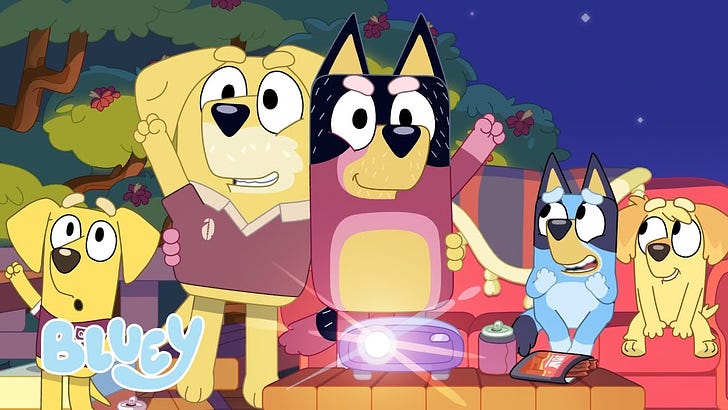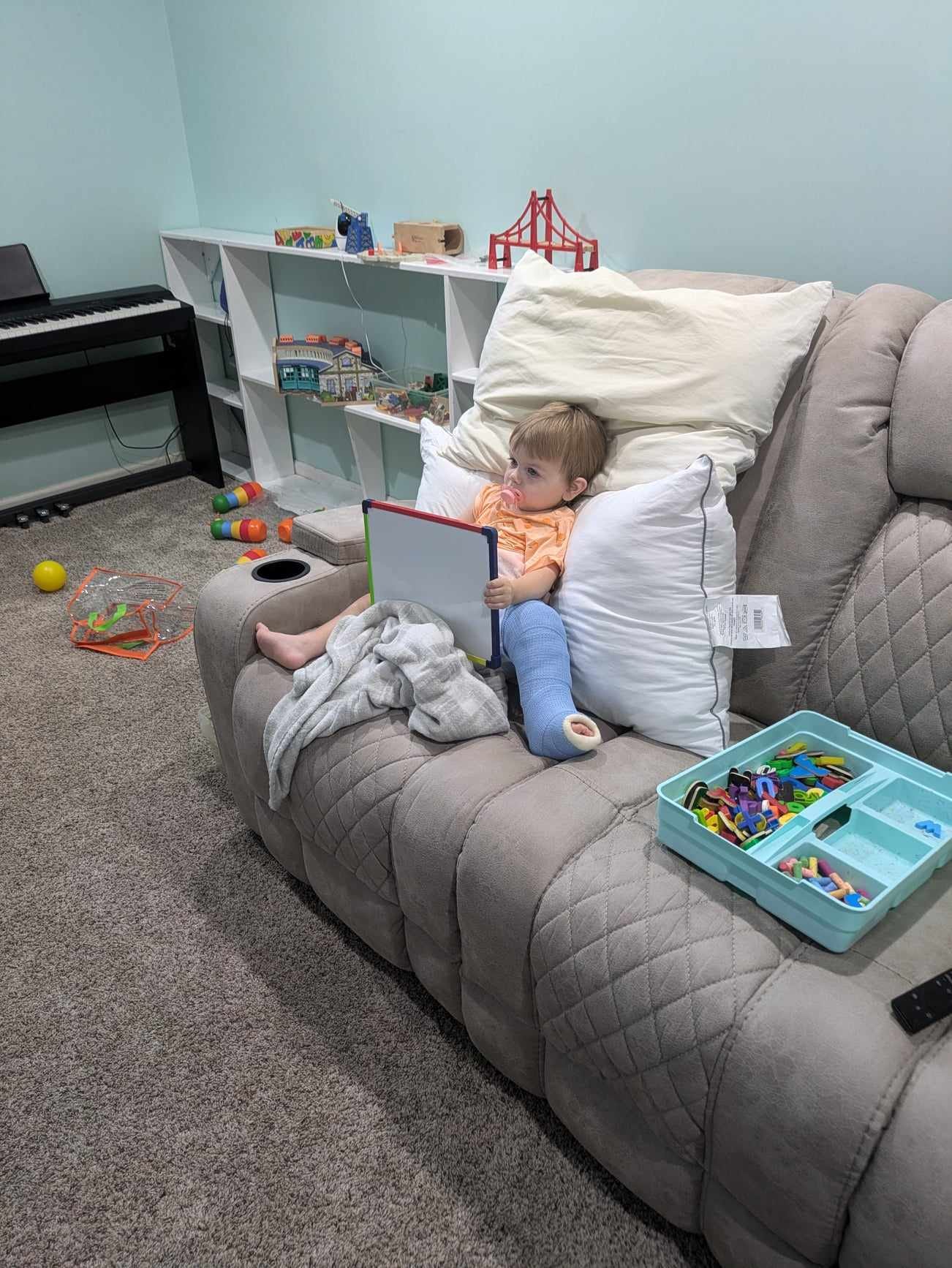"The Decider" and the Unanswerable Question of Identity
A few more musings on Bluey from the beleaguered father of a hip-dysplasia baby
Good afternoon! It’s Monday once again, and we have survived one week with a 19-month-old in a spica cast.
As such, my brain is again full of a rather small number of things, but I think I can manage something insightful this week.
… Provided you permit me to talk about Bluey again.
Now, truth be told, I think I’d have gotten around to talking more about Bluey even if it wasn’t on the TV in my house literally 6+ hours a day. It’s a beautiful show, as I’m sure someone in your life has told you already. We’ve even used it to help explain mimetic desire in our Artisans of Peace program.
Bluey has always had some pretty remarkable things to say about rivalry, identity, and conflict. One episode explores how we tend to distrust strangers, seeing them as “enemies,” only to be disarmed by the ways in which they’re very much like us–all with some subtle class commentary to boot. Another presents an aspirational vision for the political process in which the “best boss” is someone who attends to the people around them and resolves conflict not through exclusion, but through making sure everyone has a place to belong in the community.
But there’s one episode I’ve found especially interesting as I watch it again (and again and again and again and again and again). That episode is “The Decider.”
In this episode, the Heeler family joins their neighbors in watching the annual State of Origin rugby match. Decentering the show’s namesake, this episode unfolds from the perspective of Chucky, Bluey’s younger friend from over the fence. Chucky is excited by the festivities surrounding what’s clearly a high-stakes game, but he’s a little confused by the whole concept of a “Purple Team” (the Queensland Maroons) and a “Blue Team” (the New South Wales Blues), and why rooting for the Purple Team has gotten everyone so much more riled than usual. He’s even more perturbed by the odd woman out: his mum, Janelle, is the only person from both families rooting for Blue.
Still, little Chucky is easily swept up into the energetic rivalry, even running between houses between goals to watch a little of the game from each side’s perspective. By halftime, though, his big brother Lucky is getting fed up, insisting that Chucky choose a side. Torn, but drawn to the fact that there’s “more dancing” on the Purple side, Chucky decides to spend the rest of the game with his dad and brother.
It isn’t an easy choice. Even on his way back to the Heeler house, Chucky–and father Pat, too–cast apologetic looks back at Janelle, who nods after them in affirmation of her son’s decision. In the end, though, Chucky is soured on a night of Maroon victory after he catches a glimpse through the window of his mom turning out the lights and despondently going to bed.
An undefined amount of time later, there’s a new game on. This time, the rivalry is between the Australian “Gold Team” (the Kangaroos) and the New Zealand “Green Team” (the Kiwis). Again, the Heelers and their neighbors gather for the big event, but this time they’re all in the same room. Chucky still doesn’t really get the concept of teams; he’s just happy both his parents are on the same one for once. In fact, everyone’s pretty jazzed about being on the same team.
“Except for your mate Mackenzie, got it?!” jeers Bluey’s dad Bandit, just in time for the Kiwi Border Collies to drive up and lovingly boo their neighbors from the road while their bewildered son asks what’s going on.
This episode has generated a surprising amount of discussion online, where it’s often held up as an allegory for divorce and the difficulty children have in navigating divided households. I’m not sure I buy what I’ll call the “textual warrant” of this interpretation; I think it reads a little too much into what the episode offers. But I do affirm that those who bring these feelings to the episode are onto something: there’s a lack of emotional closure in “The Decider” that sets it apart from other Bluey episodes.
In most episodes of Bluey, some problem or question plagues a member of the family, and by the end of it the different members of the community work together to arrive not so much at an answer as a deeper understanding. As the characters work through concrete problems, bigger off-screen issues get resolved as well. The classic “Duck Cake” (which also features some of the most tear-jerking images of fatherly affection and vulnerability I’ve ever seen) is a wonderful example.
In the more recent “Stick Bird,” too, father Bandit has to help little Bingo cope with the frustration of having her sandcastle ruined by some rambunctious boys who didn’t know any better. As the drama unfolds, though, we also see that Bandit’s had something on his mind all day which has kept him from being 100% present at the beach with his daughters. It’s not until he watches Bluey coach Bingo through turning her own negative emotions into a game that Bandit privately tries the little ritual out on himself, releasing himself from his own hidden, “adult” concerns.
In these little dramas, the concrete is routinely caught up into and enriches the abstract; a local “fix” becomes a more general pattern for communal life, and everyone benefits existentially from the work that goes into helping one another out.
It’s not quite the same, though, in “The Decider.”
This episode also opens with a concrete problem: Chucky’s mum and dad root for different rugby teams, which leaves Chucky feeling divided: “Whenever Mum is happy, Dad is sad. And whenever Dad is happy, Mum is sad.” What’s more, Chucky doesn’t particularly understand why this state of affairs exists in the first place, or how everyone can be so accepting of and even excited about it.
By the end of the episode, this core emotional tension is not resolved. Chucky still doesn’t understand teams or sports rivalries; he’s just glad that he can now join into the rivalry with both his parents. Because his parents are on the same team, his identity is no longer divided. But then Bandit reminds us that this is possible only because the Gold Team is against the Green Team, and the comedy of bewilderment passes from Chucky over to Mackenzie, who also hasn’t the faintest idea of what everyone is so excited about. “The Decider” is one of Bluey’s most classically comic episodes because, on the other side of the drama, we see the old status quo still in place. Nobody’s really learned a lesson.
Not that there’s necessarily a lesson to be learned here; this isn’t a criticism of “The Decider,” or even of sports culture. But I do think this episode displays astounding insights into the natures of belonging and rivalry by not trying to resolve or answer the emotional tensions that rivalry produces. Instead, it simply lets hang the fact that we are odd creatures, getting caught up in rivalries we don’t understand. We’re not sure why, but such things give us meaning and a sense of identity, of belonging. And somehow, despite these strange sectarian behaviors we’re compelled towards, we manage to love each other.
… Until we don’t.
“The Decider” understandably explores only the benign side of rivalry. But we also have examples of how sports rivalries can go out of control, leading to vandalism and even murder. And sports loyalties may be among the least volatile forms of rivalry. From his earliest scholarship, René Girard argued that rivalry is a core element of how humans relate to one another. We form our identities “over-against” the other, who represents a threat to our identity but also the very possibility of our having a self-identity at all.
Authors Jim Wilder and Ray Woolridge use the term “enemy mode” to describe the ways human beings tend to approach conflict in absolute terms of winning and losing. Current brain science even suggests there’s a sort of genetic switch that flips during adolescence which activates human tribalism; around the age of 14, we start looking outside our families for our sense of “us,” and start preferring those we identify as “our people.” We might even become more loyal to certain representatives of our group identities than we are to our own families.
And this is the detail that really gets to me in “The Decider,” that tells me there’s more going on under the hood: Chucky, as a child, really never “gets” why sports loyalties have the potential to divide his family. But his big brother Lucky does; a model adolescent, his switch has been flipped; he’s been initiated into the larger worlds of identity and rivalry. He can’t explain any of this to his little brother, of course; there’s nothing to explain. It really does just seem to be how we are.
Only Chucky earnestly asks, “Why?”
By keeping the focus on Chucky, and by not really resolving any of his core tensions, this episode of Bluey invites us to keep his questions open for ourselves. It’s not about shaming ourselves for liking sports, or even for getting into rivalries; this is how we are, at some level. But it does lead us to wonder whether there’s some unplumbed wisdom in the “childish” perspective we leave behind as we get older; a part of us still asking whether, over some hazy horizon, there might yet be better ways of relating to one another and understanding who we are.






This is the ONE Bluey episode our kids refuse to rewatch, whilst we could watch all the others on repeat for what seems like years. The lack of closure is so apparent and uncomfortable to them.
Of course you just did that to a Bluey episode. I love it. There is real depth in some of the insights that come through the show. I am writing in identity at the moment. I will use your insights yo further my research!